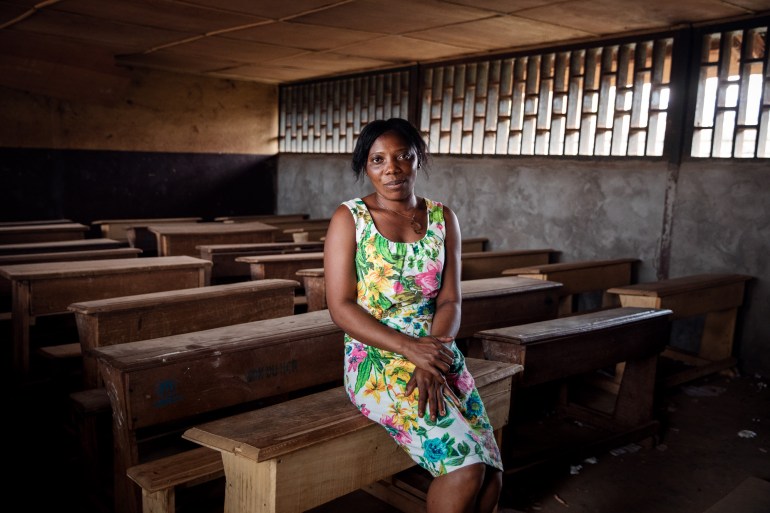Central African Republic votes in poll amid sporadic violence
UN ‘determined’ to help CAR vote on Sunday as rebel alliance resumes march on the capital, Bangui.

Central African Republic residents turned out in significant numbers for presidential and legislative elections on Sunday, the head of the United Nations mission said, despite rebels opening fire in some areas to try to scare away voters.
Armed groups hostile to President Faustin-Archange Touadera, who is seeking a second term, have carried out attacks and threatened to march to the capital Bangui and disrupt the election after the constitutional court this month rejected several candidates, including former President Francois Bozize.
Keep reading
list of 3 itemsThree UN peacekeepers killed in CAR ahead of Sunday’s elections
CAR rebels call off truce, resume march on Bangui as polls loom
Touadera is considered the favourite in the field of 17 candidates. Vote counting began on Sunday and full provisional results are expected by the end of the week.
Touadera is considered the favourite in the field of 17 candidates.
His main challenger is Anicet Georges Dologuele, a former prime minister who finished runner-up in 2016 and is supported by Bozize.
The election will go to a second round if no candidate receives more than 50 percent of the vote.
After a slow start and sporadic gunfire in some towns, the head of the UN mission in the country said in a statement that there was a huge turnout. He did not provide details.
“This morning, they (rebels) started firing, hoping to scare people away from voting. Yes, in certain areas, it is difficult but in many other areas, you can see people going out massively to vote,” Mankeur Ndiaye said.
The crisis has left many in the diamond and gold-rich nation of 4.7 million exhausted, stirring fears of a return to the worst violence of CAR’s recent past.
Al Jazeera’s Catherine Soi said earlier there has been little disruption in the voting process.
“We’ve seen hundreds of people here, many of them are telling us they are determined to cast their ballot for peace,” she said, speaking from the capital Bangui.
“Voting is still going on smoothly in many parts.”
Soi said there have been reports of people hiding out in bushes in some areas, fearing for their safety.
“Some people are waiting to see how safe it can be for them to come out and vote,” she said. “We have been talking to UN officials as well who have told us that these problem areas are few and most of the country is safe enough for people to come out and cast their voting ballots.”
Since independence from France in 1960, the country has experienced five coups and numerous rebellions.
Several opposition candidates as well as a recently formed coalition of armed groups – the Coalition of Patriots for Change (CPC) – have called for the elections to be delayed, but the CAR government and the United Nations have rejected the call.

The CPC – comprising several armed groups accused of war crimes by Human Rights Watch (HRW) – launched an offensive last week and threatened to march on Bangui.
The government called the move a “coup” led by Bozize, a claim the former president denied.
The rebel alliance briefly seized Bambari, the CAR’s fourth-largest city, last week but their progress was halted when Russia and Rwanda sent troops to shore up Touadera’s government, while the UN mission in South Sudan sent 300 peacekeepers to the country to “secure” Sunday’s elections.
More than 55,000 people have fled their homes for fear of violence in recent weeks, according to the UN, while HRW said at least five civilians had been killed.
On Saturday, the UN – which has more than 12,800 peacekeepers in the country – said “unidentified armed combatants” killed three peacekeepers from Burundi in attacks in the central Kemo prefecture and the southern Mbomou prefecture.
“We are going through a crisis but the government wants these elections to take place, regardless of the pressure enforced by the armed groups,” Alexander Cyril Ngozo, an election observer in Bangui, told Al Jazeera ahead of the polls.
“I’m especially worried for my fellow citizens in the countryside. They are people who don’t do politics. What is happening is not in their interest and they are the ones finding themselves in this bad situation once again.”
Yvonne Vola, an 80-year-old mother of nine, is adamant on going to vote, hoping for “lasting peace”.
“I have taken my voting card and I will go vote. It is my country, and I will vote to find lasting peace. I want peace to continue selling my things,” Vola, who sells peanuts and cassava on a roadside in Bangui, told Al Jazeera.
“With nine children, I have to make a lot of effort. Without peace, it does not work. We will be hungry.”

‘Determined to vote’
Denise Brown, head of the UN mission in CAR (MINUSCA), said her agency was “determined” to help people exercise their right to vote in the presidential and legislative elections.
Describing the situation in Bangui as calm, Brown told Al Jazeera on Saturday that all of the instability in CAR was “localised in several communities in the west of the country”.
“Distribution of the voter cards is ongoing and the electorate of this country who are registered to vote are coming in large numbers to collect their cards,” she said on the eve of the polls.
“The population is determined to vote tomorrow. And we are determined, at the United Nations – with the support of the international community – to ensure that the vote goes ahead.”
CAR’s constitutional court also ruled on Saturday that the presidential elections will proceed as planned on Sunday.

Reporting by Adrienne Surprenant in Bangui